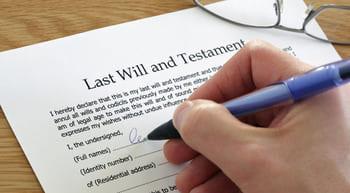Everything you need to know about money on divorce and separation. From the cost of legal advice to protecting your finances and home ownership.
In addition to the emotional cost, relationship breakdown has a financial cost for those involved. Whether a couple are married, in a civil partnership, or co-habiting, there are many issues related to money that need to be considered when the relationship breaks down. The cost of getting legal advice can mount up, before disputes regarding the family home, joint finances or children are even taken into account. Here we look at some of the financial issues to consider when a relationship breaks down.

Protecting yourself during divorce or separation
There are some steps relating to your home and finances that should be taken if you are ending a co-habiting relationship or are planning to divorce. With regard to the house, you will need to register your interest in the property if your name is not on the mortgage or you may need to change the type of ownership. If you are co-habiting then a lot depends on who 'owns' the property and whether you have an interest in it. In any event, you will need to contact the mortgage lender or landlord about property.
Obtaining legal advice and other cost
Making sure that you get the right advice is vital, no matter how amicable a divorce and separation might be. It is always a good idea to seek advice to make sure your interests are protected. That could mean seeing a solicitor, a collaborative family lawyer, a mediator, an accountant or financial advisor. There are many costs associated with divorce and separation, including the cost of advice from the aforementioned professionals. In addition, there may be court fees if you are getting divorced, which will vary depending on where in the UK you live. You will need to pay costs for filing the divorce or dissolution as well as fees for orders to obtain financial help.
Keeping it cheap
If you want to reduce the amount of money you have to pay out during divorce proceedings then you may not need to use a solicitor for the whole process. A 'Do It Yourself' divorce is ideal if things are easy to sort out. However you need to ensure that your rights are properly protected. The process for this type of divorce and separation can take about four months and can be managed by either completing the court forms yourself or by using an online divorce or dissolution service. You can still use a solicitor when necessary.
Dealing with the family home if you have a mortgage
The options for the family home if you jointly own it with your partner, are the same whether you are married or not. This could mean selling it and splitting the proceeds; keeping it in both names but with one party living in it until any children turn 18; transferring some of the value from one person to the other as part of the financial settlement; or one person buying the share of the other. All circumstances are different, however you should consider the needs of any children and eliminating the joint mortgage so that one party might be able to buy themselves another home. If you are co-habiting but the mortgage is in one person's name then you might be able to make a claim on the value of the property but this will require legal advice.
Dealing with the family home if you are renting
If you are in a rented home then the way in which this is dealt with will depend on whether it is a private landlord or social landlord and the terms of the tenancy agreement. If the tenancy is in your sole name then you are within your rights to ask your partner to move out but if you intend to stay in the property you need to make sure you can afford the rent. Ending the tenancy may seem like the best solution but this may not be possible and you might lose money. Housing matters are complicated so get some advice from a specialist lawyer or a housing charity.
Financial issues relating to children
Both people in a relationship have a duty to pay for any children until they are at least 16. There are four options available with regard to maintenance for any children on divorce and separation. A court-ordered arrangement is used where one party might be a high earner. At the other end of the scale, a family-based arrangement is often appropriate when both parties have agreed the maintenance between them. The other option is using the Child Maintenance Service which can either calculate payments for you, or can offer a Collect and Pay system where it will take money from one partner and pay it to the other.
Dividing up other finances
Dividing up investments and savings after any sort of relationship breakdown is relatively straightforward. Anything in your sole name is yours, however if your ex-partner has made a contribution then they may be able to claim a share. If you are not married and you give an investment to your ex-partner then you may be liable for Capital Gains Tax, however this does not apply if you were married or in a civil partnership.
What sort of financial settlement?
The options for financial settlement in the case of divorce are generally a 'clean break' where all finances are resolved upon divorce. Sometimes this can involve one person paying the other a 'lump sum' to prevent a lengthy maintenance claim. However, in some cases spousal maintenance may have to be paid. This is a regular payment made until particular circumstances apply, such as the remarriage of the receiving party, where one person dies or the arrangement comes to an end.
Circumstances that may change your financial position
In the case of divorce, it may be possible to review any financial maintenance settlement in the event of a change of circumstances. If the recipient finds that they are struggling there may be a case for review. Likewise, if one party's financial circumstances change to make them better off then they may be able to pay a lump sum in order to effect a 'clean break' and end regular maintenance payments to the other party. The death of either party or new relationships can also change the financial situation following divorce.





